Ah, at long last, Richard Alpert's back story via flashback! Based on the polls, I agree with the overwhelming majority of fans who voted this one of the greatest episodes of Lost ever.
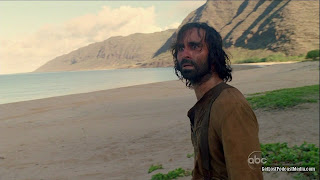
While the scenes between Richard, Jacob and the Man in Black stand out as particularly excellent, I was also thoroughly enchanted by the earlier parts of Richard's flashback. It's been too long since we've had a flashback depicting how a certain character came to the island. That used to be half the fun of Lost, and I'm very glad - relieved, even - that we were able to take this journey with Richard before the end.
I've always respected Nestor Carbonell's acting on Lost, but this episode moved him much closer to the top acting tier. Richard's vulnerability, confusion, loneliness and devotion to his faith were believable only because the actor was believable.
In fact, one of the only the negative things I have to say about this episode is that it makes a lot of the others seem weak by comparison. I think I would much rather have flashbacks (or more flashbacks) for Richard, Ilana, Frank, Charles Widmore, Miles and Ben than spend anymore time in the Alternate Timeline (ATL). I enjoy much of the ATL, and wouldn't mind it except that there are too few hours of Lost left, and so much worthy flashback material still remains. Well, ultimately we'll have to reserve judgment on the ATL until we learn how it truly fits in with the Main Timeline (MTL).
But, anyway, back to "Ab Aeterno". Having read some of the comments on the DarkUFO poll, I'm gathering that many of you interpreted this episode as concrete proof that Jacob is the good entity and the Man in Black is the evil one. I beg to differ. Both are capable of good and evil, of forgiveness and condemnation, of violence and mercy. And both manipulate others for their own ends. The "good" people are those who have the courage and determination to follow them, not because they believe Jacob and the Man in Black are gods, but in order to protect their loved ones.
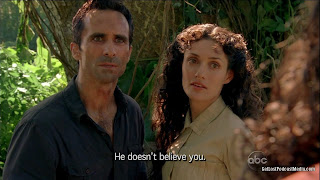
In any case, Ilana's mission is to bring the six remaining candidates to the Temple and ask Richard for further instructions. But with the Temple destroyed and only two and a half candidates on hand, she figures it's time for Richard to do some explaining, anyway. And then, Richard begins an entire hour of phenomenal acting with a disarming, desperate laugh.
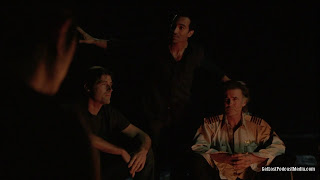
Richard doesn't know what to do. He doesn't know anything, according to Ben. But he does let them all know that the island isn't what they think it is. Richard reminded me of Desmond here (and in another key place in the episode, in just a bit), at the Beach Camp in "Live Together, Die Alone". Remember when, drunk and frustrated, Desmond explained that the island was a snow globe and the rest of the world was gone? In desperate times, certain characters come to believe very funny things about the island.
Richard doesn't mean "hell" in the figurative sense. The island is literally hell, and everyone is dead. This is what one entity has told him, at least. But at the moment, this is the entity he believes. So Richard sets off to join the Man in Black - cue flashback.
But first... Hurley is talking in Spanish to a ghost! I was guessing Ana Lucia - which is so stupid, why am I always expecting Ana Lucia? - but since we find out who it was later, there's little point discussing it.
And so we go back. Not ALL the way back - not to ancient Egypt - but back to the Canary Islands in 1867. As it turns out, the Canary Islands actually have a connection to ancient Egypt. It's tenuous, but it's there. The Canary Islands are named after 'canaari', which means, in Latin, "the ones who worship dogs." Apparently, the indigenous people worshiped dogs as their gods. The other most famous dog-worshipers are in fact the ancient Egyptians, whose god of the afterlife, Anubis (pictured in the hieroglyphics under the Temple wall where Ben encounters the Smoke Monster), is associated with dogs. Historians don't know whether the people of the Canary Islands were in contact with the Egyptians, though ancient Greek texts establish that the Greeks knew of them.
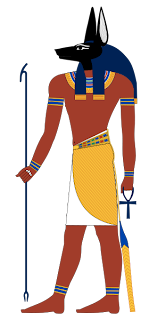 Richard comes home one day to find his wife very sick, and hurries to fetch the doctor. He carries with him his wife's cross, which he hopes to sell in exchange for the doctor's services. Unfortunately, the doctor tells him the cross is "worthless", a not so subtle jab at the idea of religion being ultimately worthwhile for Richard. But Richard won't take no for an answer, and frantically, violently demands that the man help his wife. When the doctor still refuses, he pushes and accidentally kills the man in a VERY similar manner as Desmond accidentally killing Kelvin Inman. The looks on their faces were so similar - they both were thinking, "I just killed the one person I needed most."
Richard comes home one day to find his wife very sick, and hurries to fetch the doctor. He carries with him his wife's cross, which he hopes to sell in exchange for the doctor's services. Unfortunately, the doctor tells him the cross is "worthless", a not so subtle jab at the idea of religion being ultimately worthwhile for Richard. But Richard won't take no for an answer, and frantically, violently demands that the man help his wife. When the doctor still refuses, he pushes and accidentally kills the man in a VERY similar manner as Desmond accidentally killing Kelvin Inman. The looks on their faces were so similar - they both were thinking, "I just killed the one person I needed most."Richard steals the medicine and takes it home to his wife, Isabella, but he's too late. He mourns her death and is arrested for murder. In prison, he reads his Bible and continues learning English. The passage he was reading from the Gospel of Luke, by the way, concerns Jesus rejecting the Devil's temptations, which is obviously relevant to the episode.
The overwhelming majority of the inhabitants of the Canary Islands were Roman Catholic in the 19th century, so Richard's spirituality makes sense. While nearly all forms of Christianity (most all religions, probably) have significant views on hell, the Roman Catholic position on hell is different from other branches of Christianity in a few important ways. Most relevant here is that God's forgiveness - which is what saves one's soul from hell - needs to be granted through an intermediary. In many other Christian sects, a person is sent to heaven or hell based on what's in their heart, on "faith alone". But Roman Catholics, at least until recent times, had to be absolved by priests in order to have their sins cleansed, and absolution was granted only if the person was truly sorry and if they made up for their mistakes by doing good works.
It is not enough for Richard to be sorry. He must do good works, too, and as his priest tells him, he has no time for that, as he is going to be hanged the following day. Of course, Richard is eventually saved from this fate in exchange for committing to 140 years of Jacob's work. As far as Catholic theology is concerned, Richard has more than made up for his sin by now. (Most of us Catholics can usually be absolved in return for saying a couple Hail Marys, or something.)

Just before his execution, an Englishman named Jonas Whitfield offers Richard a chance to live in exchange for his servitude, a deal that Richard gladly accepts. S0 he sets sail with the Black Rock under the leadership of Magnus Hanso, bound for the new world.
Let's do a little fact-checking here. As many of you pointed out in the comments on the episode poll, America wasn't exactly "new" in the 1860s. However, that's not conclusive enough for me to definitively rule out America as the Black Rock's destination. I think it likely that Richard was referring to America when he mentioned wanting to start a family with Isabella in the "new world". A huge number of people from the Canary Islands emigrated to South America during the mid-to-late 19th century, to places like Venezuela. With so many of his countrymen leaving, Richard could have easily wanted to go there.
But I don't know if Jonas Whitfield was referring to America when he mentioned the "new world". It's 1867, the Civil War has just ended and slavery is illegal in the United States. As for South America, it's possible that varying degrees of indentured servitude were still taking place, so Hanso could have been heading there to sell his captives. I do want to mention another possibility, however. Australia is very much still a "new world" in the 1860s. Gold had been discovered in the 50s, and certain Australian colonies were experiencing gold rushes. I couldn't find out whether Australia had indentured servitude at the time, but it was still partly a prison colony for the British, so it seems plausible to me that Hanso was headed to Australia to get rich working his slaves in the mines.
This would of course also explain how the Black Rock crashed on an island we know to be in the middle of the Pacific (if you sailed from the Canary Islands to America, you wouldn't cross the Pacific, but you would if your destination was Australia). This also links Richard's journey, thematically speaking, to the Oceanic 815 survivors.

Richard's on-island experience is awful from the very beginning. His buddy and fellow captive remarks that God saved them, only to be ruthlessly murdered by Jonas Whitfield moments later, as if a reply rang out, "No, God did not save you."
Richard is saved by the Smoke Monster, which kills all the other survivors and leaves Richard chained inside the ship without food or water. He tries to break free but can't. He's nearly attacked by a boar. Days go by. He must be thinking that his predicament is truly a fate worse than death.
And then, his wife appears to him and informs him, very matter-of-fact, that they are in hell. She tries to help Richard out of the chains, but can't, and instead is forced to flee from the Smoke Monster, which may or may not have gotten her.
I'm fairly certain that this apparition of Isabella wasn't really her (the one at the end of the episode, now that probably was). The Man in Black probably appeared in her form in order to foment the idea in Richard's mind that the island was hell and the Devil was Richard's enemy.

Eventually, he does appear in what seems to be his regular form, the black-shirted man. And, like he eventually will do for Sawyer, Sayid, Claire and Kate, he presents Richard with the thing he most desires - the keys that will unlock his chains. "It's good to see you out of those chains," he remarks, after extracting a promise that Richard will help him.
Outside, a hearty meal awaits Richard. I know I frequently mention parallels with Stephen King's The Stand, but this was another jump-out-at-you one. MINOR PLOT REVEAL FOR THE STAND: In the wake of the flu epidemic that kills pretty much everybody in the world of The Stand, one of the lone survivors is a man named Lloyd, who's locked up in prison. Since everyone else is dead, he slowly starves to death in his cell, until "the Man in Black", called Randall Flagg in this novel, appears to him and offers him freedom and a delicious meal in exchange for his service. This deal that Richard keeps getting is very similar to Flagg's deal with Lloyd. Lloyd becomes Flagg's right-hand man, in much the way that perhaps Richard would have become MIB's right-hand man had he decided to stay with him.
MIB confesses to being the Smoke Monster, confirms that the island is hell and says that the Devil has Richard's wife. He presents Richard with a dagger and instructs him to go to the statue and kill him without letting him speak. These were of course the exact same instructions that Dogen gave Sayid in "Sundown". It may have even been the same dagger. But unlike Dogen, it seemed that MIB thought, or at least hoped, that Richard had a chance at succeeding.

Since MIB seems to be a generally honest, though manipulative, entity, I'm not sure, "this is hell and Jacob is the Devil" was actually an outright lie. From MIB's perspective, the island is hell. It's his eternal prison. And Jacob, his prison keeper, is the Devil, a devil that has robbed MIB of his humanity and identity. This speech played right into the Esau and Jacob theories, as Esau stole Jacob's birth right and inheritance by tricking him with a bowl of soup. "He can be very persuasive," MIB warns. That's certainly coming from someone who was once fooled by Jacob, and now regrets it.
Jacob drags Richard into the water and dunks him thrice to prove he isn't dead and the island isn't hell. In such a manner, Richard is baptized into Jacob's religion of "protect the island, keep MIB at bay." Jacob explains that MIB is a malevolent force that must be contained, and the island is what prevents MIB from unleashing havoc upon the world. Jacob brings people to the island in order to demonstrate that people can choose to do good - that their free will can lead them in such a direction. It's implied that he's been disappointed so far.
Richard asks why Jacob doesn't just tell them what to do himself. He's a Catholic, remember, so he's used to intermediaries assigning tasks. Jacob then invites Richard to become his intermediary, communicating instructions to future island inhabitants. Interestingly enough, Jacob rewards Richard by giving him something he almost certainly does not want - eternal life. This was totally a con: Jacob made Richard think that was what he wanted and tricked him into accepting it. Unwittingly, Richard promises to assist Jacob as a protector of the island.

In person, the Man in Black begs Jacob to just let him leave the island. Jacob retorts that as long as he lives, MIB will never leave. And Jacob is the good guy? He could be, but he could easily be the bad guy. Maybe Jacob loses his power if MIB leaves the island, and whereas MIB only wants to be free, Jacob is obsessed with the religion he has built up around himself, and must hold onto his power. If MIB is malevolence incarnate, as the pro-Jacob forces claim, how was he once human? He wasn't always this way, then.
As I've said before, I'm inclined to believe that Jacob and the Man in Black are simply different entities with some differing philosophies but many of the same operating procedures. Both are expert con men, both murder or allow murders to take place, both have lied to the people who were following them, etc. There are faith and science, destiny and free will questions built up around both of these characters. But good and evil? If anything, MIB is the more sympathetic one, based on the fragments of his history we've learned. And for that matter, Jacob's philosophy seems flawed. He doesn't want to tell people what to do, but telling Richard to tell people is almost exactly the same thing.
Not that the Man in Black is necessarily Mr. Free Will all the time. When he gives people the choice between obeying him and dying, it's not really much of a choice. My point is only that far from Jacob being good and MIB being bad, it's just as likely that both have good and bad in them. Think of the role they play in this episode, as the little angel and the little devil sitting on Richard's right and left shoulders, just like in all those great cartoon shows. But whenever an angel and a devil appear on a character's shoulders in other media, isn't the point usually that both the angel and the devil are misleading the character for their own ends, and that the character would be better off telling both of them to take a hike?
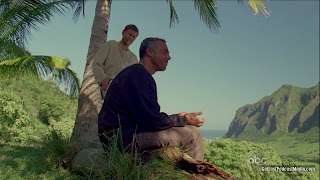
As a parting gift, Jacob hands the MID a corked bottle of wine. Has there ever been a better metaphor for the island. It is indeed "The Fork in the Outlet".
But there's something else Richard needs to do, too, according to Isabella on behalf of Hurley - he must stop the Man in Black from leaving, or "we all go to hell."
In the distance, Flocke watches the exchange, clearly displeased that Richard will not be joining him after all.

As for the deeply religious undertones in this episode, I don't think the island is actually hell in the Catholic or religious sense. It's a hell for those who want to leave, who have lost loved ones or suffered greatly during their time there. But it's also a place where miracles happen, where people are given second chances, can be healed of their pains, both physical and otherwise, where scientific research can be conducted. Hell is a matter of interpretation. After all, in another tale named Lost - Paradise Lost, that is - John Milton's Devil declares "Tis better to rule in hell than to serve in heaven."
My point is only that the island doesn't, and probably never will, fit nicely into an easy explanation like "it's hell." Rather, the island is and will always be a fork in the outlet, a cork in the wine bottle - a point in time and space at the hub of an enormous amount of energy, power, goodness, evil, etc. And those on the island can, at times, harness those qualities, those "unique geological properties of the island", as Pierre Chang called them.
I'll end this recap with one final connection between Lost and the Canary Islands. Over the course of the Canary Islands' history, people claimed to have seen a vanishing and reappearing eighth island. So there you go, the number 8, and a mysterious island. Oh, and the Canary Islands were the location of a famous plane crash in 1977, the year of the Incident in the Lost universe. Thanks to Lostpedia for the info.
Thanks for reading, see you next week.
- Robby "Robz888"
